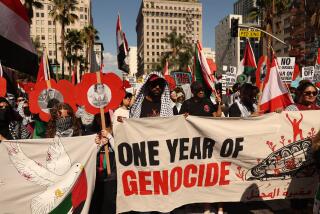An isolated Hamas firmly rejects talks
- Share via
GAZA CITY — Excluded from the Mideast peace conference in Maryland, Hamas on Tuesday summoned tens of thousands of its followers in the Gaza Strip to protest the gathering and reject any agreements that might grow from it.
Demonstrators chanted, “We will never recognize Israel!” and called Palestinian Authority President Mahmoud Abbas a traitor and collaborator for attending the U.S.-sponsored meeting.
The protest was one of several this week by Palestinians and Israelis opposed to the peace conference. In the West Bank city of Hebron, a demonstrator was shot and killed Tuesday as Palestinian security forces dispersed a small crowd. It was unclear who shot him. And in the city of Ramallah, Palestinian police clubbed and arrested protesters before they could gather for demonstrations.
A night earlier in Jerusalem, the main Jewish settlers group in the West Bank called together several thousand Israelis to protest ceding any part of the holy city to the Palestinians.
The Bush administration hopes that an agreement reached Tuesday in Annapolis, Md., to start substantive talks between the Israelis and Palestinians will jump-start a peace process stalled for nearly seven years. But Hamas leaders belittled the gathering as only chipping at the edges of Palestinians’ long-standing concerns, such as their claim to part of Jerusalem as a future capital.
“We reject Annapolis and its results,” Ismail Haniyeh, a leader of the Islamic militant group, said in televised remarks before the rally. “We will stand against any attempt to harm or dismantle the resistance.”
Hamas, feeling increasingly isolated, is poised to play the spoiler if a new Israeli-Palestinian peace process gets legs. Although the radical Islamic group risks being pushed further to the margins, it stands to gain if Israel and the moderate Palestinian Authority leadership fail to turn the staged cordiality of Annapolis into serious peacemaking.
Security officials in Israel had been on heightened alert out of concern that Hamas would seek to sabotage the talks by launching an attack in Israel or the West Bank, but the group’s leaders said the conference was doomed to fail on its own.
Hamas leaders were dismayed by the broad Arab participation in the Annapolis conference, and especially by Syria’s decision to attend. For Hamas, their presence was a worrisome sign that more Arab nations were easing closer to normalized relations with Israel.
“They are actually more worried by the Arab participation in the conference than the Palestinian Authority’s participation,” said Bassam Nasser, a Palestinian analyst in Gaza City.
Hamas has been in sole control of the Gaza Strip and its 1.4 million residents since June, when its forces routed fighters from Abbas’ Fatah party. Abbas, a moderate backed by the U.S., now governs only the West Bank.
Relations between the two factions have grown more bitter since then. Two weeks ago, at least seven people were killed when Hamas police fired on a Fatah rally in Gaza City.
Still, it would be difficult for Abbas to make good on a peace deal with Israel unless Hamas went along with it or was vanquished.
Hamas, which calls for the destruction of the Jewish state and is classified as a terrorist organization by the United States, the European Union and Israel, has remained defiant in the face of increasing isolation.
Western nations cut off aid to the Palestinian Authority after Hamas won parliamentary elections in January 2006. After Hamas’ armed triumph over Fatah five months ago, Israel closed its borders with the coastal strip, adding to Gazans’ sense of being cut off.
Hamas stands to gain street support if attempts to revive the peace process falter.
But the movement also has troubles. There are growing signs of internal friction, and hard-liners such as Mahmoud Zahar, the Palestinian Authority foreign minister fired by Abbas after the June violence, increasingly appear to hold sway in Gaza. And recent polls show that public opinion among ordinary Palestinians has shifted in Fatah’s favor since June.
Hamas’ ability to retain control of Gaza may hinge in part on how its residents respond to the continued misery wrought by sealed borders and resulting shortages. The squeeze could damp support for Hamas, though worsening social conditions might boost backing for extremists.
Special correspondent Abu Alouf reported from Gaza City and Times staff writer Ellingwood from Jerusalem. Special correspondent Maher Abukhater in Ramallah contributed to this report.
More to Read
Sign up for Essential California
The most important California stories and recommendations in your inbox every morning.
You may occasionally receive promotional content from the Los Angeles Times.










